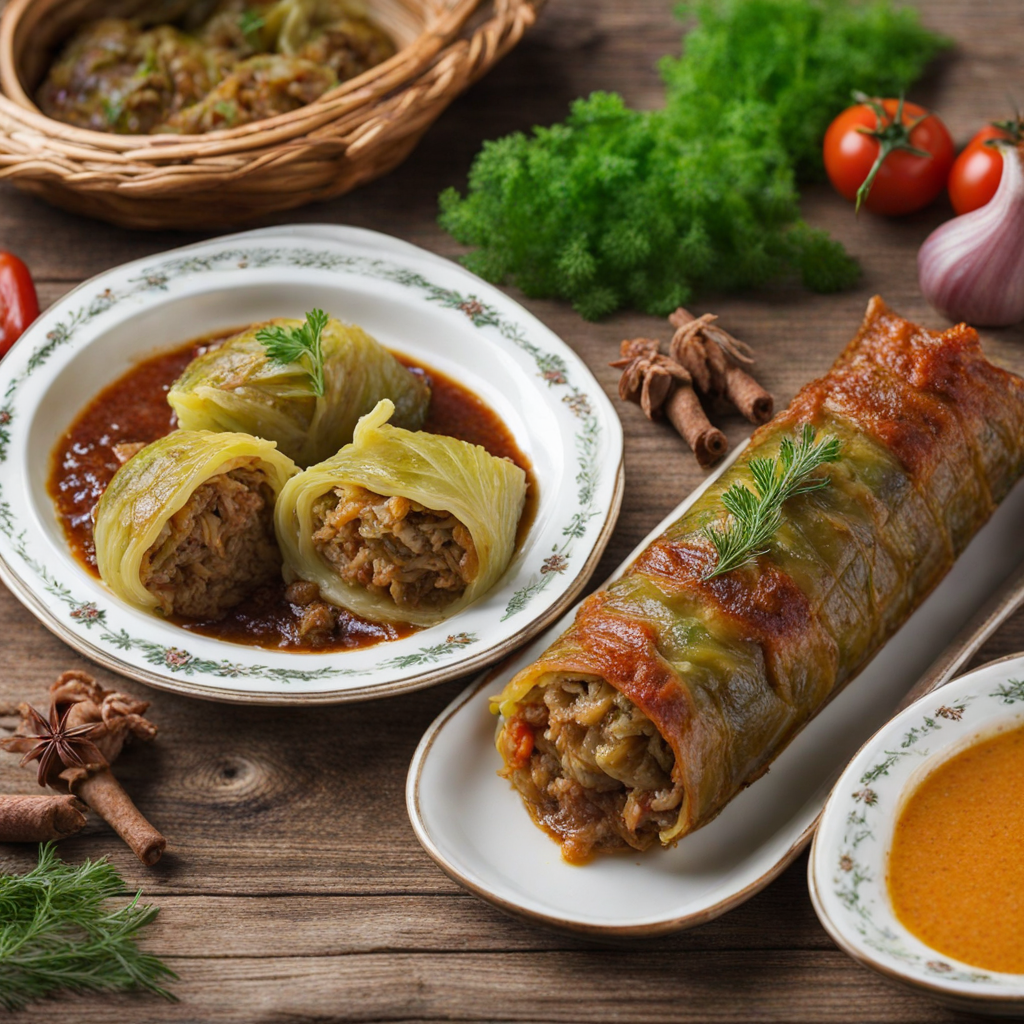Bulgarian Yogurt
Bulgarian yogurt, renowned for its rich, creamy texture and distinctive tart flavor, is a staple of Bulgarian cuisine that has captured the hearts of food enthusiasts worldwide. Made from cow's, sheep's, or goat's milk, this yogurt is fermented using a unique combination of beneficial bacteria, primarily Lactobacillus bulgaricus and Streptococcus thermophilus, which not only gives it its characteristic taste but also contributes to its probiotic properties. The result is a velvety yogurt that balances a refreshing tanginess with a subtle sweetness, making it incredibly versatile in both savory and sweet dishes. Traditionally, Bulgarian yogurt is enjoyed on its own, often drizzled with honey or sprinkled with nuts for a simple yet satisfying treat. It can also be used as a base for a variety of dishes, such as the popular Shopska salad, where it is dolloped on top to add creaminess and depth. Additionally, it serves as the perfect accompaniment to grilled meats, giving a cooling contrast to spicy flavors, or as a key ingredient in soups like the cold summer dish, Tarator, which combines yogurt with cucumbers, garlic, and dill for a refreshing starter. What sets Bulgarian yogurt apart from other yogurts is its cultural significance and the traditional methods of preparation that have been passed down through generations. Its probiotic-rich nature not only aids digestion but also promotes overall health, making it a nourishing choice for those seeking to explore new tastes and textures. Whether enjoyed simply, incorporated into recipes, or used as a base for smoothies, Bulgarian yogurt offers a delightful culinary adventure that promises to awaken the palate and inspire a new appreciation for this ancient dairy delicacy.
How It Became This Dish
The History of Българско кисело мляко: A Cultural and Culinary Icon of Bulgaria #### Origins: The Birth of a Tradition Българско кисело мляко, or Bulgarian yogurt, is much more than a simple dairy product; it is a cornerstone of Bulgarian culture and cuisine, steeped in history and tradition. Its origins can be traced back to ancient times, with evidence suggesting that yogurt-making practices were prevalent in the Thracian civilization that inhabited the region of present-day Bulgaria. The Thracians, known for their agricultural practices and animal husbandry, likely discovered the process of fermentation accidentally, as milk left out in warm conditions naturally developed beneficial bacteria. The significance of yogurt in the Balkan region is underscored by the presence of wild strains of Lactobacillus bulgaricus, a specific bacteria essential for the fermentation of Bulgarian yogurt. This bacterium thrives in the natural conditions of the Bulgarian climate, which, combined with traditional knowledge, led to the development of a unique yogurt-making culture. The simple process of combining milk and these cultures to create a creamy, tangy product became an integral part of the local diet. #### Cultural Significance: The Heart of Bulgarian Cuisine Throughout the centuries, Българско кисело мляко has evolved into a symbol of Bulgarian identity. It is not just a food item, but a representation of heritage and community. In Bulgarian households, yogurt is often served at breakfast, accompanied by bread and herbs, or used as a base for various dishes, including the popular shopska salad. This versatility made it a staple in rural diets, where it provided essential nutrients and probiotics beneficial for digestion. Culturally, yogurt has been intertwined with various rituals and customs. It is traditionally associated with celebrations and hospitality; offering yogurt to guests is a gesture of goodwill and welcome. The folklore surrounding yogurt is rich, with tales of its health benefits and even its role in folk medicine. Many Bulgarians believe that consuming yogurt contributes to longevity and vitality, a belief that has been reinforced by the scientific community, which has identified the health benefits of probiotics. Moreover, Bulgarian yogurt plays a pivotal role in the country's agricultural economy. The lush pastures of Bulgaria, nourished by its diverse climate, provide ideal conditions for dairy farming. Local farmers have historically relied on the production of yogurt as a means of sustenance and income, and today, it remains a vital part of Bulgaria’s agricultural output. The unique qualities of Bulgarian yogurt have garnered international attention, leading to its recognition as a product of geographical indication (PGI) by the European Union in 2013. This designation not only protects the authenticity of the product but also elevates its status on the global stage. #### Historical Development: From Tradition to Modernity The journey of Българско кисело мляко through history is marked by various developments that reflect broader social and economic changes in Bulgaria. During the Ottoman Empire's rule, which lasted for nearly five centuries, the introduction of new culinary practices and the blending of cultures influenced Bulgarian foodways. However, yogurt remained a staple, with its preparation techniques being passed down through generations. In the late 19th and early 20th centuries, Bulgaria witnessed significant changes, particularly with the advent of industrialization. This period saw the establishment of dairy cooperatives and the modernization of dairy processing techniques. As transportation improved, yogurt became more accessible to urban populations, leading to a surge in its popularity. The establishment of dairy factories and the introduction of pasteurization allowed for a more consistent product, paving the way for the commercialization of Bulgarian yogurt. Post-World War II, with the establishment of the socialist regime, there was a push for mass production of traditional foods, including yogurt. The government initiated programs to promote dairy farming and yogurt production, ensuring that this staple remained a key part of the Bulgarian diet. During this time, the distinct characteristics of Bulgarian yogurt, such as its creamy texture and slightly sour taste, were preserved, while also being made available to a wider audience. The collapse of the socialist regime in the early 1990s brought about another transformation in the dairy industry. The privatization and liberalization of the market led to a resurgence of artisanal yogurt-making as small producers sought to reclaim traditional methods and recipes. This shift not only underscored the importance of quality and authenticity but also encouraged a renewed interest in the health benefits of fermented foods. #### Global Recognition: A Culinary Ambassador In recent decades, Българско кисело мляко has gained international recognition, becoming a culinary ambassador for Bulgaria. Its unique flavor profile and health benefits have captured the attention of food enthusiasts and health-conscious consumers worldwide. The rise of the global yogurt market has opened new avenues for Bulgarian yogurt, with many producers exporting their products to international markets. In addition to its presence in supermarkets, Bulgarian yogurt has found its way into the menus of various restaurants and is often featured in fusion cuisine, showcasing its versatility. Chefs have experimented with incorporating it into both traditional dishes and modern culinary creations, further elevating its status and appeal. Despite its growing popularity outside Bulgaria, the essence of Българско кисело мляко remains deeply rooted in the traditions of Bulgarian culture. It continues to be celebrated in local festivals and culinary events, where artisans and farmers gather to showcase their products and share their knowledge of yogurt-making. #### Conclusion: A Timeless Tradition The story of Българско кисело мляко is a testament to the resilience of culinary traditions amidst a changing world. From its ancient origins to its modern-day status as a symbol of Bulgarian culture, yogurt represents the intersection of history, health, and community. As it continues to evolve and adapt, it remains a cherished element of Bulgarian cuisine, embodying the spirit of a nation that prides itself on its rich agricultural heritage and culinary legacy. In a world increasingly focused on wellness and natural foods, Bulgarian yogurt stands out not only for its taste and texture but also for the deep cultural connections it fosters. As more people discover the joys of this fermented delight, the story of Българско кисело мляко will undoubtedly continue to unfold, bridging generations and cultures through the simple pleasure of good food.
You may like
Discover local flavors from Bulgaria







